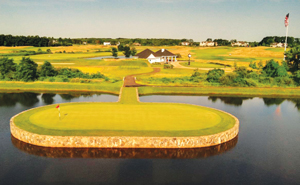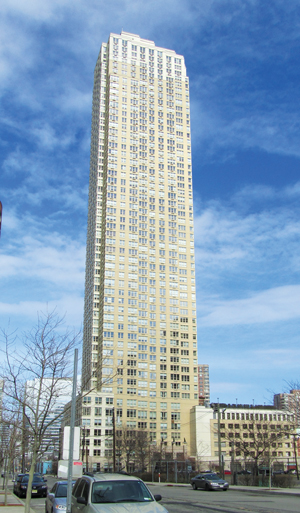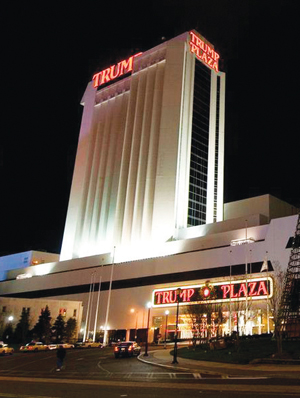The Republican front-runner and celebrity real estate mogul may be from Queens, New York, but for the last three decades Donald Trump has made it his mission to leave his mark on New Jersey. The Real Deal looked at Trump’s track record across the Hudson River, including his biggest hits and even bigger misses.
SUCCESSES
The Trump National Golf Club and Resort, Bedminster
The Donald purchased the sprawling 520-acre estate in 2002 from a group of investors that had halted work on the site after running out of money. The property had become synonymous with failure, having previously sunk the fortunes of failed carmaker John Z. DeLorean, who sold it at a bankruptcy auction in January 2000. After acquiring it for less than $35 million, Trump went to work on restoring the resort’s fortunes and by 2005 had turned it into a top-100 golf course and a favorite spot among lawmakers and celebrities. The club, which costs an initial $350,000 to join, is now worth more than $50 million, according to Trump’s financial disclosure report. In 2014, it was announced that the Trump National Golf Club and Resort would play host to the 2022 PGA Championship.
Trump National Golf Club, Colts Neck

Trump National Golf Club, Colts Neck
When Trump bought the Shadow Isle Golf Club in 2008, he took over a business on the brink of disaster. The club was in foreclosure with a dwindling membership and in desperate need of a change in direction. Trump immediately brought in renowned golf course architect Tom Fazio, who had worked on the successful course in Bedminster, to give the site a facelift. The club is currently engaged in a membership drive, offering reciprocal privileges across all Trump properties.
Trump Plaza Residences, Jersey City

Trump Plaza Residences, Jersey City
The 532-foot condominium tower, which was completed in 2008, remains one of the tallest buildings in New Jersey and a desirable landing spot for those who work in lower Manhattan. At an average price of more than $1 million, the condo units are far from cheap, but the convenient location, plentiful amenities and stunning views of the Manhattan skyline have made this residential development popular with buyers. Though Trump does not own it personally, instead licensing his name out for a hefty fee, the development has benefited from the branding — almost all of the condos have been sold. Another residential development, Trump Bay Street, is under construction a block away.
BLUNDERS
The Trump Taj Mahal, Atlantic City
When the lavish Taj Mahal opened its doors in April 1990, it was dubbed the largest casino the world had ever seen. Built at a cost of approximately $1 billion, it was also one of the world’s most expensive. The guest of honor at the opening was the King of Pop, Michael Jackson, who was given a tour of the colossus by the billionaire himself. Just 15 months later, having accrued debts of almost $3 billion, the Taj Mahal filed for Chapter 11 bankruptcy protection. Trump, who had financed the casino with $675 million in junk bonds, had bet his fortune and reputation on a falling pack of cards. Earlier this year, activist investor Carl Icahn swapped $292 million of debt he held on the Taj Mahal for complete ownership of the property, thereby eliminating Trump’s remaining 10 percent share.
Trump Plaza, Atlantic City

Trump Plaza, Atlantic City
In 1984, Trump partnered with Holiday Inn to launch a grand 39-story casino resort called Harrah’s. Less than two years later he bought out Holiday Inn’s stake and renamed the casino Trump Plaza. After the dismal performance of the Trump Taj Mahal, the Trump Plaza filed for Chapter 11 bankruptcy protection in 1992. In 1995, Trump managed to consolidate his Atlantic City operations into a publicly traded company initially called Trump Hotels & Casino Resorts. The company filed for bankruptcy first in 2004 and again in 2009 when Trump was forced to resign as chairman. The Trump Plaza shut its doors in September 2014 after posting the second biggest loss of all Atlantic City casinos in the first six months of the year.
The EnCap Project, New Jersey Meadowlands
In 2007, Trump signed a deal to transform the landfills in the New Jersey Meadowlands into a luxury golf course and condominium development. At the time, Trump lauded the commercial possibilities of the 785-acre garbage site, stating that it had “the potential to be one of the great jobs anywhere in the world.” But the following year, the New Jersey Meadowlands Commission pulled the plug on the planned redevelopment, citing Trump’s “failure to secure adequate and unconditional financing.”
The New Jersey Generals and the United States Football League
In 1983, Trump, then a 37-year-old hotshot soaring into the limelight, bought the New Jersey Generals franchise in the United States Football League. Full of hubris, Trump persuaded fellow franchise owners to compete with the NFL by moving games to a fall schedule instead of playing in the spring. He also helped  orchestrate a $1.7 billion anti-trust lawsuit against the NFL in which it was alleged that the older league had prevented the USFL from obtaining a television contract. The USFL won a puny $3 in damages and soon after ceased all operations. The Donald had set into motion the destruction of an entire football league.
orchestrate a $1.7 billion anti-trust lawsuit against the NFL in which it was alleged that the older league had prevented the USFL from obtaining a television contract. The USFL won a puny $3 in damages and soon after ceased all operations. The Donald had set into motion the destruction of an entire football league.
